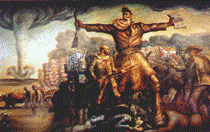History, Department of

James A. Rawley Graduate Conference in the Humanities
Date of this Version
April 2008
Document Type
Article
Abstract
This paper explores the community of the U.S. Congress and its various approaches to the dispersal of the public domain over the course of the nineteenth century. Congressional decisions stand not only as the work of a community of lawmakers, but also, through individual votes, reflect the values and beliefs of the communities represented by individual legislators. This paper seeks to understand how the Congressional community understood the various issues related to free land legislation, beginning with preemption acts in the early nineteenth-century, and various other legislative efforts to govern the dispersal of the public domain. The paper will examine in depth the ways in which ideas about gender, race, and citizenship impacted three specific pieces of free-land legislation, beginning with the 1850 Oregon Donation Act. This research also considers these issues as related to the Homestead Act of 1862 and the 1887 General Allotment Act (1887). Ultimately, this paper explores how legislative decisions regarding the public domain were arrived at and what these decisions tell scholars about the community of Congress and the communities these men represented.


Comments
Paper presented at the 3rd Annual James A. Rawley Conference in the Humanities — Imagining Communities: People, Places, Meanings. Lincoln, Nebraska, April 12, 2008. Sponsored by the University of Nebraska–Lincoln History Graduate Students’ Association. Copyright © 2008 Tonia Compton.